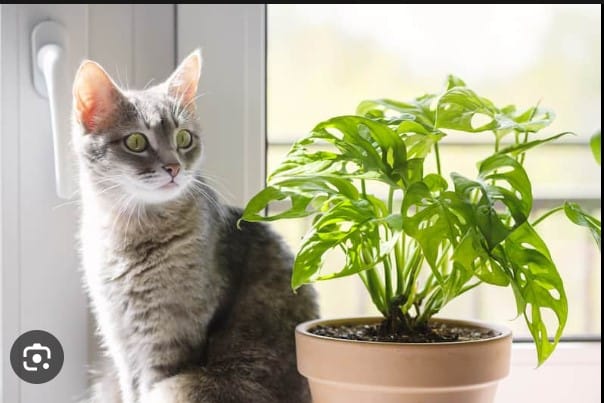In recent years, the phenomenon of indoor gardening has blossomed into a widespread trend, captivating the hearts of plant enthusiasts worldwide. Among the multitude of botanical beauties, one plant stands out for its captivating allure and unmistakable charm — the Monstera deliciosity. However, amidst the fervor surrounding Monstera plants, a question arises, particularly for pet owners: Are Monstera plants toxic to cats? In this comprehensive guide, we’ll explore whether Monstera plants pose any toxicity risks to cats. From understanding Monstera toxicity to exploring safe alternatives as well as assessing the risks and preventive measures. We’ll provide you with the essential information to ensure the well-being of your feline friends.
Monstera plants, with their lush, tropical foliage, have become a popular choice for indoor décor enthusiasts. The Monstera boasts sprawling, glossy leaves. Its iconic perforations add to its appeal. It has surged in popularity. It graces homes, offices, and social media feeds. The plant exudes tropical elegance. However, pet owners often raise concerns about the safety of these plants around their furry companions, particularly cats.
See also: Are Poinsettias Poisonous to Cats?
Understanding Monstera Toxicity
Monstera plants, scientifically known as Monstera deliciosa, are beloved for their striking appearance and relatively low maintenance requirements. With their glossy green leaves and unique perforations, they add a touch of elegance to any space. While these plants are prized for their aesthetic appeal, pet owners must be aware of their potential impact on the health of their cats.
The toxicity of plants varies significantly, and it’s crucial to assess the risks associated with having them in your home. Especially if you have pets. In the case of Monstera plants, understanding their toxicity level and potential effects on cats is essential for creating a safe environment for your furry companions. Let’s delve deeper into the question: Are Monstera toxic to cats?
Monstera plants contain calcium oxalate crystals, which are common in many houseplants and can cause irritation or discomfort if ingested. While these crystals may not be lethal to cats, they can lead to some symptoms. Some of which are drooling, vomiting, and oral irritation. Additionally, the ingestion of large quantities of plant material could potentially result in more severe gastrointestinal issues. Therefore, it’s essential for cat owners to take precautions to prevent their pets from nibbling on Monstera leaves.
See also: Is Bamboo Toxic to Cats?

Assessing the Risks
Monstera plants may not be highly toxic to cats. It’s essential to note that not all cats will react to them in the same way. This is, despite the potential risks associated with Monstera plants. it’s also essential for pet owners to assess the risks associated with having these plants in their homes. Cats may exhibit varying levels of interest in chewing on houseplants. With some showing little interest while others are more curious. Understanding your cat’s behavior and taking precautions to prevent access to Monstera leaves can help mitigate potential hazards. Continue reading the article, Are Monstera plants toxic to cats, for better understanding.
Preventive Measures
Pet owners can take several preventive measures to minimize the risk of their cats encountering Monstera plants. Also, it’s worth considering the placement of Monstera plants within your home. Placing plants in places where cats cannot access it. Areas such as high shelves or hanging planters can help prevent accidental ingestion. Additionally, providing alternative sources of stimulation for your cat is essential. These include catnip or interactive toys. They can redirect your cat’s attention away from houseplants.
However, it’s essential to recognize that removing all potential hazards from your home may not be feasible. In addition to Monstera plants, there are numerous other common household items that can pose risks to cats. Items ranging from household cleaners to certain foods. Therefore, it’s crucial to be vigilant and proactive in creating a safe environment for your pets
Neither ignoring nor underestimating the potential dangers of toxic plants is advisable. While Monstera plants may not be among the most toxic plants for cats, it’s essential to treat them with caution and respect. Taking appropriate measures to mitigate them is the best way to ensure the well-being of your feline companions. As well as educating yourself about the potential risks.
See also: Melatonin for Cats

Recognizing Symptoms and Seeking Veterinary Care
It’s crucial for pet owners to recognize the symptoms of Monstera toxicity in cats. Symptoms may include drooling, vomiting, oral irritation, and gastrointestinal issues. Prompt intervention can help prevent further complications and ensure that cats receive the necessary treatment for their well-being. Furthermore, if you suspect that your cat has ingested any part of a Monstera plant, it’s crucial to seek veterinary care immediately. Are Monstera plants toxic to cats? This article answers that question.
Symptoms of Monstera Toxicity
Cats who have ingested parts of a Monstera plant may exhibit a range of symptoms. These can vary in severity depending on the amount consumed and the individual cat’s sensitivity. Common symptoms include:
- Excessive drooling
- Vomiting
- Oral irritation, manifested as pawing at the mouth or vocalization
- Gastrointestinal upset, such as diarrhea or decreased appetite.
Observational Vigilance
Pet owners should remain attentive to any changes in their cat’s behavior or appearance, particularly if they suspect the cat has met a Monstera plant. Signs of distress or discomfort should be promptly addressed to prevent further complications.
See also: Are Peonies Poisonous to Cats?
Seeking Veterinary Care
If you observe any of the symptoms or suspect that your cat has ingested a Monstera plant, it’s crucial to seek veterinary care without delay. Veterinarians can provide prompt assessment and treatment to alleviate your cat’s discomfort and mitigate any potential health risks.
When seeking veterinary care, provide as much information as possible about the suspected ingestion, including the type of plant involved, the quantity consumed, and the onset of symptoms. This information will aid veterinarians in formulating an appropriate course of action.
Pet owners can safeguard their cats’ health while enjoying the beauty of indoor greenery. This can be achieved by remaining vigilant. As well as understanding the symptoms of Monstera toxicity and seeking veterinary care as needed.

Exploring Safe Alternatives
In addition to understanding the potential risks of Monstera plants, cat owners may also be interested in exploring safe alternatives for indoor greenery. Fortunately, there are numerous non-toxic plant options that can beautify your home without posing any risks to your pets. Some examples include spider plants, Boston ferns, and African violets, all of which are safe for cats to be around.
More so, incorporating pet-friendly plants enhances indoor spaces. These plants create a vibrant atmosphere. They welcome both humans and pets. By choosing plants that are non-toxic and safe for cats, you can enjoy the benefits of greenery without worrying about potential hazards.
In addition to selecting safe plants, it’s essential to consider other factors that can contribute to a pet-friendly home environment. Ensuring that your cat has access to fresh water, nutritious food, and comfortable resting areas is essential for their well-being. Creating a stimulating environment with plenty of opportunities for play and exploration can also help keep your cat happy and healthy.
See also: Are Hydrangeas Poisonous to Cats?
Safe Alternatives Examples
Fortunately, a diverse array of non-toxic plants exists, providing ample options for creating a verdant and pet-friendly indoor oasis.
Spider Plants
Renowned for their elegant, arching foliage and air-purifying properties, spider plants are an excellent choice for households with cats. These resilient plants thrive in a variety of conditions and produce cascading tendrils adorned with miniature plantlets, adding visual interest to any space.
Boston Ferns
With their lush, feathery fronds and graceful demeanor, Boston ferns exude timeless elegance. These humidity-loving plants are renowned for their air-purifying abilities and thrive in bright, indirect light, making them ideal companions for both cats and humans alike.

African Violets
Adored for their vibrant blooms and compact growth habit, African violets bring a splash of color to indoor environments. These petite plants prefer moderate lighting conditions and well-draining soil, making them suitable additions to windowsills and tabletops where they can brighten the day without posing risks to curious feline companions.
Peperomia Plants
With their diverse foliage patterns and compact growth habits, peperomia plants offer a wealth of options for adding texture and visual interest to indoor spaces. These low-maintenance plants thrive in bright, indirect light and are well-suited to life alongside cats, thanks to their non-toxic nature.
You can cultivate a lush and inviting environment while ensuring the well-being of your beloved pets. This is made possible by incorporating these safe alternatives into your indoor gardening repertoire. From cascading spider plants to vibrant African violets, there’s a pet-friendly plant to suit every aesthetic preference and space constraint. Embrace the beauty of botanical diversity and create a sanctuary where both plants and pets can flourish harmoniously.
See also: List Of Cat Toxic Flowers
Conclusion
While Monstera plants contain calcium oxalate crystals that can cause irritation if ingested, they are not typically considered highly toxic to cats. However, it’s essential for pet owners to be aware of the potential risks and take steps to prevent their cats from accessing these plants. Understanding pet safety is crucial. Making informed choices about indoor greenery matters. You can create a harmonious environment. It benefits both you and your pets. Thriving together is the goal.

